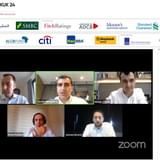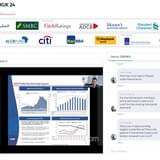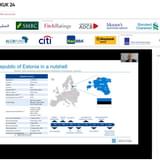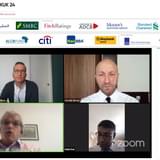Ugras Ulku, Deputy Chief Economist for the Institute for International Finance, believes the Turkish economy will likely face strong headwinds this year as concerns about security and political stability look likely to weigh on Turkey’s investment, exports and tourism revenues throughout 2017.
“Falling investment and weak private consumption and exports will likely cause real GDP growth to slow to 1.5% this year from an estimated 1.7% in 2016,” the economist explained.
The clearest indicator of problems the Turkish economy faces is the lira. The currency has been one of the worst-performing in in the emerging market basket of currencies over the past six months, which has seen it lose over a third of its value against the US dollar from its peak in May 2016.
“In an attempt to ease depreciation pressures on the lira, the Central Bank has lowered reserve requirements for FX liabilities and tightened the lira liquidity markedly in the interbank market in early 2017,” Ulku explained.
In a somewhat controversial decision at the end of January, the Central Bank tightened lira liquidity conditions but only raised the overnight lending cost and left the main interest rate untouched. This action did little or nothing to settle the markets, with the lira tumbling another 1% against the US dollar after the actions were announced.
“Measures short of a sizable interest rate hike look unlikely to be sufficient for Turkey to begin restoring investor confidence and attracting foreign capital inflows,” Ulku said.
This represents a huge problem for Turkey, which desperately needs to attract capital inflows to finance its large external financing needs this year; at the same time, continued monetary tightening in the US is likely to weigh on the external funding conditions for emerging markets and Turkey in particular, which depends heavily on foreign currency-denominated investment.
With the CBRT’s limited FX reserves and Turkey’s FX revenues set to remain depressed in 2017, “the ability of Turkey to avoid further lira depreciation will depend on authorities’ ability to devise policies that restore confidence and attract capital inflows,” Ulku said.
Whether this will materialise is another question entirely. The government’s resistance to raising interest rates is viewed by many analysts as more of a political decision than an economic one. Furthermore, with the volume of the government’s insistence to keep rates low slowly rising along with new constitutional reforms aimed at concentrating further power with the executive, some have raised concerns over institutional independence as the government looks to keep credit flows and growth robust while managing inflation, which is trending above 8.5%.
President Erdogan has been a harsh critic of high-interest rates, which he has deemed partially responsible for shocking Turkey’s economy.
“Regarding aims, there is no difference between a terrorist who has a gun and a bomb in his hands and those who have dollars, euros and interest rates,” Erdogan told reporters earlier this month.
After been approved by Parliament, the Turkish government is ready to head to the polls in April to fight for reforms that will allow Erdogan to stay until 2029, allowing him further control over budgets, the ability to appoint judges, and dismiss the Prime Minister. The referendum will most likely be followed by early general elections, potentially extending a period of political uncertainty well into the second half of 2017.









